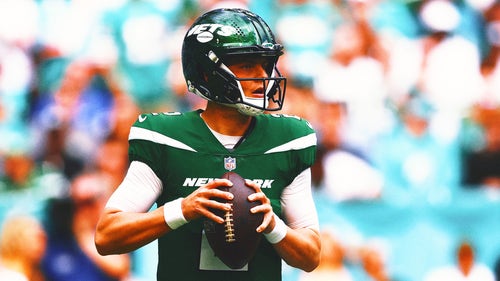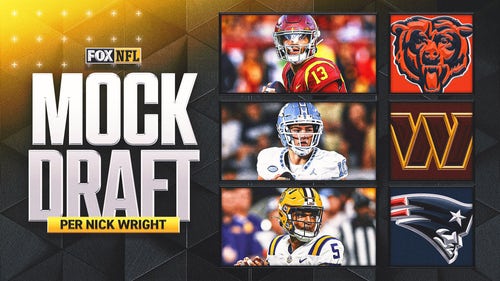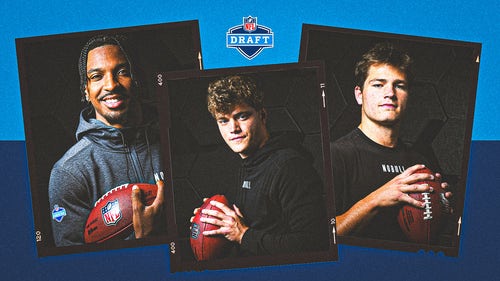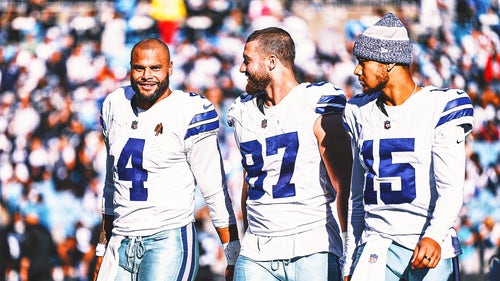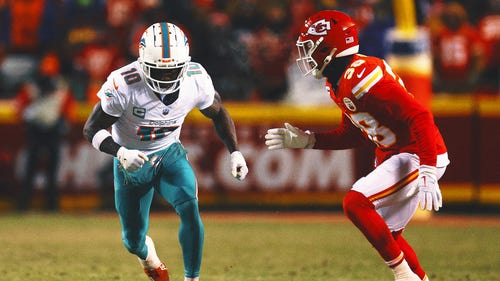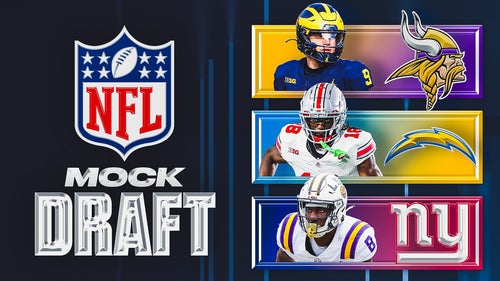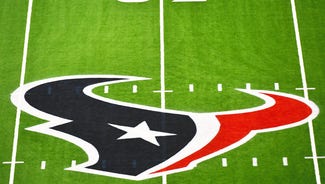
Draft lingo is a special language
It’s that time of year.
Until the 2011 NFL draft is completed, you’ll hear draft analysts spout scouting lingo.
Some of the terms you’ll understand, some you won’t.
But if you really want to be a “draftnik,” you’ll need to get a better idea of what they mean.
Scouting Terms For Offensive Players
Quarterbacks
“Looking down the gun barrel”
When I first started visiting with Greg Cosell at NFL Films, he would often use this phrase.
It means a quarterback must stand in the pocket and not turn his body in the face of pressure.
Eli Manning dealt with this issue for several years.
“Throwing from all platforms”
It has often been said a good quarterback doesn’t necessarily have to be an over-the-top thrower. It’s OK to make a three-quarter or sidearm throw as long as the ball gets there — see Philip Rivers.
Quarterbacks who do this look like they are too tight throwing the ball and have a hard time uncoiling.
“Cabin fever”
I often get this in the winter, but that’s not exactly what it means.
This refers to quarterbacks who go through just one progression instead of a full set, then run instead of pass.
“Seeing ghosts”
A negative term for a quarterback who moves for no reason. Quarterbacks who get sacked a lot often deal with seeing things that are not there — see David Carr over the years.
Running Backs
“Satellite player”
Former NFL head coach Bill Parcells used this phrase a lot.
This refers to a back who lines up all over the field — typically, not a feature back. Reggie Bush fits this description well.
“Jitterbug runner”
This is your basic speed or elusive runner.
“Runs behind his pads”
I’ve heard NFL analyst Ron Jaworski use this many times.
This is a back who doesn’t run upright.
“Methodical runner”
This refers to a patient back.
Former University of Alabama running back Mark Ingram probably fits this description well.
“Upright”
A back such as this one runs too high, which makes him susceptible to getting hit too much. These backs generally have a higher rate of fumbling.
“Lateral agility”
NFL Films’ Greg Cosell often uses this phrase to describe running backs who possess excellent speed.
In addition, this means backs who are able to get outside of the formation and make unblocked defenders miss.
Wide Receivers/Tight Ends
“Hands like feet”
Talk about a derogatory term. Gawd.
Do I really need to explain this one?
It means a guy has bad hands.
“Quicker than fast”
NFL Network’s Mike Mayock often uses this phrase.
This means a wide receiver or tight end who moves well off the line, but generally isn’t fast. Rather, he has good short-area quickness.
“Straight-line speed”
You’ll often hear draft analysts talk about wide receivers having built-up or straight-line speed, meaning they really aren’t truly fast. They can run fast in a straight line, but don’t have good short-area quickness.
“Suddenness”
This phrase refers to wide receivers who have an explosive first step.
“Plays faster than his 40 time”
This means a player moves or looks better on game tape than his 40-yard dash time would suggest. San Diego State wide receiver Vincent Brown would be a good example of this.
“Possession guy”
I hate this phrase because it’s quite discriminatory.
It generally refers to wide receivers who run slower than a 4.5 40-yard dash, so scouts throw them all into a group as possession receivers.
They basically brand them as slot or No. 3 wide receivers.
“One-trick pony”
This phrase refers to players who do only one thing well.
Randy Moss has earned this nickname in the past because some personnel evaluators believe he’s strictly a deep threat (won’t go over the middle) and does little else.
There are plenty of defensive players who probably fit this phrase quite well.
“Long strider”
Wide receivers who take longer strides when they run (see Roy Williams) usually earn this title. These receivers won’t fit in a lot of offensive schemes.
“Move guy”
Athletic tight ends who aren’t asked to block much fit this bill. Jermichael Finley is probably the top “move” tight end in the NFL.
“Inline blocker”
You’ll often hear scouts refer to these guys as blocking tight ends.
Offensive Linemen
“Light in the ass”
This phrase refers to offensive linemen who are too light below the waist and need to put on some weight.
“Knee bend”
Good knee bend, as you probably guessed, means good flexibility from a lineman.
“Redirect”
If you’re ever at a practice, whether it’s pro or college, you’ll often hear coaches scream at their linemen to redirect.
This means to go from one side to the other with their pass set.
“Dancing bear”
No, we’re not talking Winnie the Pooh with this one.
Athletic offensive linemen with great feet (Joe Thomas and Ryan Clady, for example) often earn this moniker.
“Waist bender”
Offensive linemen who don’t play with a good base and bend at the waist too much generally will earn this tag from personnel evaluators. They also tend to lose body control by bending too much.
“Road grader”
This type of offensive lineman is a guard or center who is a power blocker or mauling type of player.
“Leaner”
Offensive linemen never want this moniker bestowed on them.
A leaner is one who over-extends and gets thrown to the ground easily. These linemen generally play too high instead of playing with a lower base.
“Good punch”
No, we’re not talking the punch from Buster Douglas that pretty much ended Mike Tyson’s career.
Good arm punch refers to offensive linemen who extend their arms out and literally punch their hands into a defensive lineman’s chest to push him back. Getting the first punch in at the snap is a huge advantage against oncoming rushers.
“Gets to second level”
This one fits in with several positions including running backs and offensive linemen.
Running backs need to get to the second level of the defense, meaning they need to make unblocked defenders miss and get to the second phase (linebackers).
And offensive linemen need to kick out and not only take care of the defensive linemen, but get to the second level of the defense (linebackers).
“Nasty”
Oh, trust me on this one. This is probably the only time you would want to be called nasty.
This term refers to what scouts look for in an offensive lineman. They want the player to be aggressive and nasty, not passive (see the criticism of Alex Barron).
Scouting Terms For Defensive Players
“Edge rusher”
This phrase refers to defensive ends or outside linebackers who can turn the corner fast. They also get good pad level and get low (see DeMarcus Ware or Dwight Freeney).
“Short-area quickness”
Because the 40-yard dash is virtually meaningless for a defensive lineman, those players must have good short-area quickness. That’s why the 20-yard short shuttle and 3-cone drill at the NFL Scouting Combine are so important for these players.
Of course, this term could also apply to a slot receiver.
“Plays too high”
Defensive linemen who are too upright often receive this moniker. If you’re at a practice, you’ll often hear the defensive line coach tell them to get lower.
“Joker”
This term, which could also apply to a tight end as a “moveable chess piece,” usually refers to a stand-up defensive end or strong-side linebacker who rushes the passer. The first time I heard this phrase was by the late Jim Johnson.
“Cuts through the wash or trash”
You’ll often hear linebackers who are physical earn this term, but in a positive way. Linebackers who are physical and push away players who come at them tend to earn praise by “cutting through the wash.”
“Tight in the hips”
You’ve probably heard Mike Mayock use this term for defensive backs over the years.
What this means is defensive backs who have to turn their hips are stiff while attempting to turn their body. Being stiff for just a split second could cost a team a touchdown, so defensive backs who are tight in the hips will get lower grades.
Wide receivers and defensive backs have to be able to turn and play in space.
“Looks like Tarzan, plays like Jane”
This could be my favorite all-time scouting term.
Don’t ever let a player hear you say this about them. If they do, I guarantee you’ll get a shiner.
Your first impression was probably correct with this one. I’ve often heard defensive players framed by this term.
It refers to a player who looks good in a uniform or physically, but basically can’t play or is very raw.
“Ankle tackler”
This refers to the defensive back who makes a tackle improperly by grabbing onto a player's lower leg.
“Fluid”
You’ll often hear scouts refer to this term when talking about defensive backs who are smooth in their movements. It also could apply to a wide receiver who is a smooth route runner.
Generic Terms
“He’s a JAG”
I first heard this term used during my first Senior Bowl trip back in 2002, but had no idea what it meant.
It certainly had nothing to do with any Jacksonville Jaguars player. A JAG is a derogatory term for an average player, or in other words, "just a guy."
“Low-hanging fruit”
This moniker refers to players who are often looked over in the scouting process. You’ll often hear undrafted free agents referred to this term.
“You can’t help the club in the tub”
This generally means players who are injured can’t help the team on the sidelines or in the ice bath rehabbing. You’ll often hear coaches or scouts say this privately about injury-prone or constantly injured players.
“Slappy”
No, it’s not a term for the comedian Slappy White.
This one refers to low-end players who don’t have much to offer teams. Some personnel sources said you could also call some low-end player agents (ones that have few clients) this term as well.






































































































































